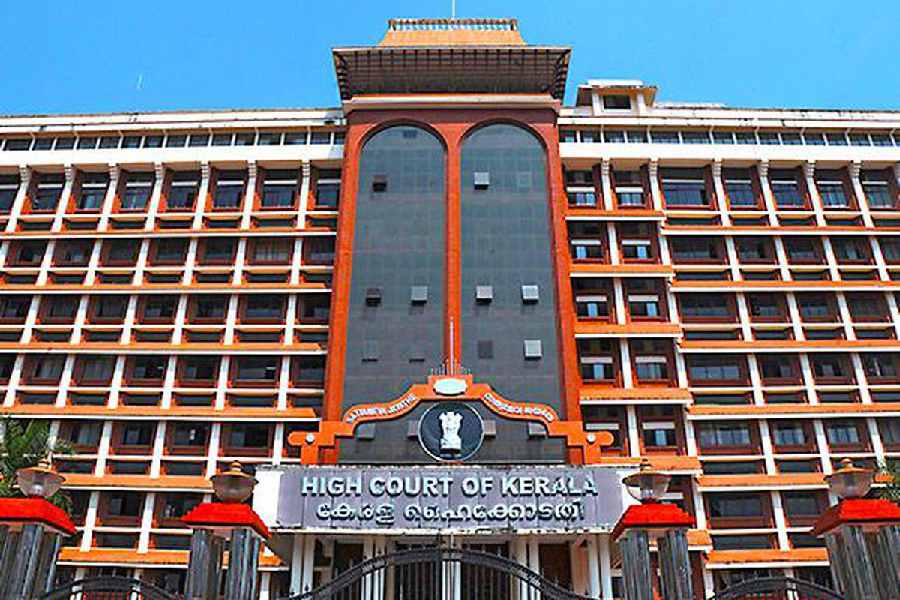The Kerala High Court has directed that no illegal religious places should be permitted on government land, irrespective of the religion.
The High Court said that God is "omnipotent" and is everywhere, including in the bodies of believers, their homes and wherever they go.
"Therefore, the believers need not encroach upon government land to construct religious structures. Let it be distributed to landless people and used for mankind. God will be more happy in such a situation and will shower blessings on all believers," Justice P V Kunhikrishnan said.
The direction and observations by the court came on a plea by the Plantation Corporation of Kerala Ltd seeking directions to the state government, police and Pathanamthitta district authorities to identify the properties leased to it and evict all the encroachers from there.
Allowing the Corporation's plea, the court directed the authorities to identify the properties leased to it and "evict all encroachers including illegal religious structures constructed on the government land, forthwith, at any rate, within a period of six months from the date of receipt of a copy of this judgment".
The May 27 order of the court also directed the Chief Secretary to instruct all the District Collectors to conduct an enquiry to find out whether any illegal unauthorised stones or cross or other structures are erected with a religious colour on any government land by any religious group.
"The District Collectors shall conduct such an enquiry within a period of six months from the date on which the orders are received from the Chief Secretary of the state.
"Once any illegal religious structures are found in the government land, the jurisdictional District Collectors with the aid of the police department shall evict the illegal religious structures from the government land, within a period of six months after the enquiry is conducted as directed above, of course after hearing the affected parties if any," the court said.
It also directed that a report regarding the action taken as ordered by the court shall be placed before it within one year.
It said that the Collectors should take action within the time schedule "so that we can live with communal harmony to strengthen the country as a sovereign socialist secular democratic republic as enshrined in the preamble of our Constitution".
Justice Kunhikrishnan, in his order, observed that every religious denomination or any section thereof has the right to establish and maintain institutions for religious and charitable purposes.
"That does not mean that the citizens can do anything which may lead to communal disharmony. Nowadays, it is a trend to erect some stones or cross in public places and government land claiming religious importance to that place and thereafter to start worshipping these stones and cross with religious colour.
"Subsequently, this will lead to temporary constructions and ultimately permanent construction treating it as a religious place. If people start to construct illegal religious structures and buildings in public places and government land, it may create friction among the religions which will definitely lead to religious disharmony," the court said.
The Corporation, in its plea, had said that in the name of religion, there has been a conscious attempt by certain political groups to trespass into its properties and to take possession of the same.
It had claimed that when it had opposed such moves, there were serious law and order problems.
The Corporation had also said that workers employed by it in the plantations live in the accommodation provided by it known as 'LAYAM'.
Most of its employees believe in Hindu religion and in the absence of places of worship near the LAYAM, they erected small buildings and placed deities in them, it had said.
The police had told the court that the Corporation had not opposed the erection of such small temples for the worship of its workers, but gradually, the local residents intervened in the affairs of such temples and they tried to erect new buildings nearby such temples.
This created friction between the Corporation and local residents, the police had said, adding that the small temples established by the workers were very old and easy to remove, but will create law and order issues.
The court said that "this is how illegal structures were emerging in the state under the guise of religious worship".
"Kerala is a small state in which there are hundreds of temples, churches and mosques. Kerala is known as 'God's Own Country'. Kerala is a state where the population is high. The government is taking steps to distribute the government land to hundreds of landless people. Some of the land is given for plantation on lease.
"Such places cannot be utilised for religious purposes. It will only create religious disharmony in the state. If one religion is allowed to erect its deity in a government land, the other religions also will start to erect their religious institutions. This will only create problems, including law and order issues in the state," the high court said.
Except for the headline, this story has not been edited by The Telegraph Online staff and has been published from a syndicated feed.











